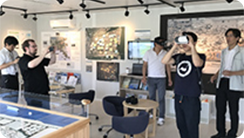What I Can Do Here and Now
Insights From the Pro Bono Project on How to Get Involved in My Local Community, Miyagi Prefecture
Ms. Chizuru Katsumata, an employee who participated in the Pro Bono project.
What I Can Do Here and Now
Insights From the Pro Bono Project on How to Get Involved in My Local Community, Miyagi Prefecture
Ms. Chizuru Katsumata, an employee who participated in the Pro Bono project.
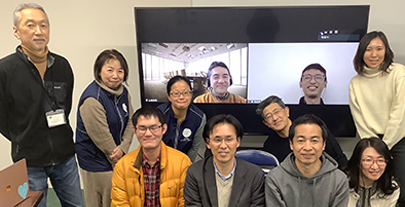
“The Pro Bono project is a form of volunteering. I would like to give back to society the knowledge and skills I have acquired through my job through the Pro Bono project. At the same time, there are so many things I can learn from the Pro Bono project,” said Ms. Chizuru Katsumata. Ms. Katsumata participated in the Pro Bono project to propose a business plan for the “3.11 Future Support Association,” an organization based in Ishinomaki City, Miyagi Prefecture, that provides reconstruction assistance following the Great East Japan Earthquake. We asked her about her encounter with a Pro Bono project and how it has changed her.
“The Pro Bono project is a form of volunteering. I would like to give back to society the knowledge and skills I have acquired through my job through the Pro Bono project. At the same time, there are so many things I can learn from the Pro Bono project,” said Ms. Chizuru Katsumata. Ms. Katsumata participated in the Pro Bono project to propose a business plan for the “3.11 Future Support Association,” an organization based in Ishinomaki City, Miyagi Prefecture, that provides reconstruction assistance following the Great East Japan Earthquake. We asked her about her encounter with a Pro Bono project and how it has changed her.
Do What You Can for Others. A Challenge That Was Just Around the Corner
Do What You Can for Others. A Challenge That Was Just Around the Corner
I have always had the desire to do something for others. When I was in my 20s, I went to Morocco for two years as a Japan Overseas Cooperation Volunteer and taught piano to children. I am currently involved in management, planning, finance, and accounting at Panasonic. I am also a member of a labor union, and I think about what I can do for the employees and their families. I also often personally participate in small volunteer activities such as tree planting. A desire to do things for others has always been at the root of my heart.
I have always had the desire to do something for others. When I was in my 20s, I went to Morocco for two years as a Japan Overseas Cooperation Volunteer and taught piano to children. I am currently involved in management, planning, finance, and accounting at Panasonic. I am also a member of a labor union, and I think about what I can do for the employees and their families. I also often personally participate in small volunteer activities such as tree planting. A desire to do things for others has always been at the root of my heart.
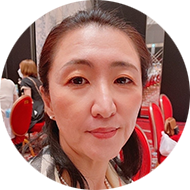
Ms. Chizuru Katsumata
My first encounter with a Pro Bono project occurred when a friend of mine founded a non-profit organization, which prompted me to think that I wanted to do something to help it. I had only worked for Panasonic, so I wanted to learn what other organizations were like where I had never worked. At about that time, I received an internal advertisement saying, “Why not take part in the Panasonic Group’s Pro Bono Project?” I thought it was a good opportunity to get to know those in different departments and companies of the Panasonic Group. I also felt comfortable being able to take on challenges with other internal members. I thought it was a really good opportunity for me.
Coincidentally, I also found a project based in my hometown of Ishinomaki City, Miyagi Prefecture. The project was to propose a business plan for the “3.11 Future Support Association,” which provides reconstruction support for the Great East Japan Earthquake. The organization needed a business plan that could generate its own funds to continue its earthquake recovery efforts even after the Reconstruction Agency’s budget subsidiary ceased. I am from Miyagi Prefecture and experienced the Great East Japan Earthquake. As someone who lives nearby, I thought I could contribute to my hometown by visiting the area. If I was going to participate in this project, I wanted to do something I could work on earnestly. With this in mind, I decided to participate.
My first encounter with a Pro Bono project occurred when a friend of mine founded a non-profit organization, which prompted me to think that I wanted to do something to help it. I had only worked for Panasonic, so I wanted to learn what other organizations were like where I had never worked. At about that time, I received an internal advertisement saying, “Why not take part in the Panasonic Group’s Pro Bono Project?” I thought it was a good opportunity to get to know those in different departments and companies of the Panasonic Group. I also felt comfortable being able to take on challenges with other internal members. I thought it was a really good opportunity for me.
Coincidentally, I also found a project based in my hometown of Ishinomaki City, Miyagi Prefecture. The project was to propose a business plan for the “3.11 Future Support Association,” which provides reconstruction support for the Great East Japan Earthquake. The organization needed a business plan that could generate its own funds to continue its earthquake recovery efforts even after the Reconstruction Agency’s budget subsidiary ceased. I am from Miyagi Prefecture and experienced the Great East Japan Earthquake. As someone who lives nearby, I thought I could contribute to my hometown by visiting the area. If I was going to participate in this project, I wanted to do something I could work on earnestly. With this in mind, I decided to participate.
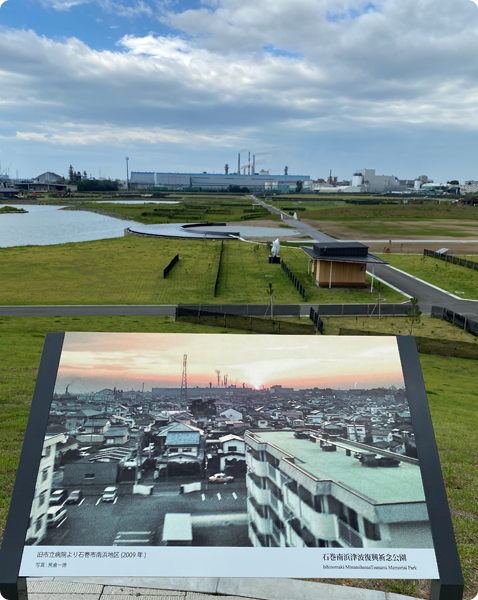
Scenery of Ishinomaki City, 3.11 Future Support Association
Pro Bono Taught Me the Ideal Way to Work
Pro Bono Taught Me the Ideal Way to Work
Once the Pro Bono project started, team members gathered every Sunday evening at 8:00 p.m. for an online meeting. We were a group willing to take on challenges, even if it meant that we had to balance them with our work. Each member has a high level of enthusiasm for the project. In the beginning, I had to admit that I had moments of thinking, “It’s Sunday night. Doesn’t anyone want to watch the TV historical drama?” However, working on the issues with those who raised their hands to take on the challenge was really exciting.
Once the Pro Bono project started, team members gathered every Sunday evening at 8:00 p.m. for an online meeting. We were a group willing to take on challenges, even if it meant that we had to balance them with our work. Each member has a high level of enthusiasm for the project. In the beginning, I had to admit that I had moments of thinking, “It’s Sunday night. Doesn’t anyone want to watch the TV historical drama?” However, working on the issues with those who raised their hands to take on the challenge was really exciting.
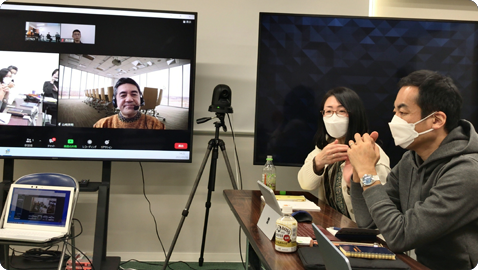
Scene of on-site meeting with the 3.11 Future Support Association staff
How the Pro Bono project has changed me the most is the way I approach projects. We set clear goals and timelines and steadily built up one by one. The project kept moving forward. I felt that this is the way work should be conducted. Looking back at my previous work and projects from the perspective of a Pro Bono work approach, there was a lot of room for improvement.
My participation in the Pro Bono project has changed the way I approach my corporate tasks. For example, I now set clear deadlines for things that need to be done and do not dawdle. My work at Panasonic involves supporting project leaders, and I now talk to them with this in mind. I apply the skills and knowledge I have gained through my work to my Pro Bono project and bring back to my work what I have learned on how to proceed with a project. I believe that both the project and myself have had a positive effect.
How the Pro Bono project has changed me the most is the way I approach projects. We set clear goals and timelines and steadily built up one by one. The project kept moving forward. I felt that this is the way work should be conducted. Looking back at my previous work and projects from the perspective of a Pro Bono work approach, there was a lot of room for improvement.
My participation in the Pro Bono project has changed the way I approach my corporate tasks. For example, I now set clear deadlines for things that need to be done and do not dawdle. My work at Panasonic involves supporting project leaders, and I now talk to them with this in mind. I apply the skills and knowledge I have gained through my work to my Pro Bono project and bring back to my work what I have learned on how to proceed with a project. I believe that both the project and myself have had a positive effect.
How the Pro Bono project has changed me the most is the way I approach projects. We set clear goals and timelines and steadily built up one by one. The project kept moving forward. I felt that this is the way work should be conducted. Looking back at my previous work and projects from the perspective of a Pro Bono work approach, there was a lot of room for improvement.
My participation in the Pro Bono project has changed the way I approach my corporate tasks. For example, I now set clear deadlines for things that need to be done and do not dawdle. My work at Panasonic involves supporting project leaders, and I now talk to them with this in mind. I apply the skills and knowledge I have gained through my work to my Pro Bono project and bring back to my work what I have learned on how to proceed with a project. I believe that both the project and myself have had a positive effect.
The Relationship Continues, Even After the Project. Discovering a New Life Goal
The Relationship Continues, Even After the Project. Discovering a New Life Goal
One of the best things about participating in the Pro Bono project was the connections I made with the people of Ishinomaki City, Miyagi Prefecture, where I grew up. I live in Miyagi Prefecture. Therefore, I traveled to Ishinomaki City many times during the Pro Bono project to serve as a bridge between the community and the team. On one occasion, I went to see the representative of the 3.11 Future Support Association. The meeting was supposed to be an hour but turned into four hours. It was then that I truly felt his enthusiasm firsthand. Since then, he has turned to me whenever he has concerns. I was thrilled to be able to build relationships with the local people beyond the framework of my own work and the Pro Bono project.
I would like to continue helping the “3.11 Future Support Association” even after I retire from work. In the local area, there is a shortage of staff, despite the mountain of work that needs to be done. I believe that having just one person who can engage in promotional activities for the organization can make a significant difference. Since I am from Miyagi Prefecture, I strongly feel that I would like to continue this relationship even after completing the Pro Bono project. I have worked here for a long time and plan to use my local connections to support the organization as a sales representative. Unexpectedly, I was able to discover my post-retirement goal.
One of the best things about participating in the Pro Bono project was the connections I made with the people of Ishinomaki City, Miyagi Prefecture, where I grew up. I live in Miyagi Prefecture. Therefore, I traveled to Ishinomaki City many times during the Pro Bono project to serve as a bridge between the community and the team. On one occasion, I went to see the representative of the 3.11 Future Support Association. The meeting was supposed to be an hour but turned into four hours. It was then that I truly felt his enthusiasm firsthand. Since then, he has turned to me whenever he has concerns. I was thrilled to be able to build relationships with the local people beyond the framework of my own work and the Pro Bono project.
I would like to continue helping the “3.11 Future Support Association” even after I retire from work. In the local area, there is a shortage of staff, despite the mountain of work that needs to be done. I believe that having just one person who can engage in promotional activities for the organization can make a significant difference. Since I am from Miyagi Prefecture, I strongly feel that I would like to continue this relationship even after completing the Pro Bono project. I have worked here for a long time and plan to use my local connections to support the organization as a sales representative. Unexpectedly, I was able to discover my post-retirement goal.
My Conversational Skills Came Into Full Play. A Place Where My Abilities Are Tested Without Being Restricted by My Position
My Conversational Skills Came Into Full Play. A Place Where My Abilities Are Tested Without Being Restricted by My Position
I believe the interesting aspect of the Pro Bono project is that you never know what knowledge and skills you will be able to put to use. My role in the Pro Bono project was “Marketer,” and surprisingly, there were many situations where my “conversational skills” came in handy. I have always preferred meeting people and listening to them rather than doing desk work such as creating material or analyzing data. Because of these characteristics, I regularly joined the internal labor union to listen to the views of other employees. Thanks to my conversational skills, I was able to listen to the concerns and issues of the representatives of the recipient organization and local field workers and communicate them in detail to our distant project members.
On the other hand, the Pro Bono team included members with a variety of skills that I did not have. Some could analyze websites. Others were skilled at calculating income and expenses. By working together with other members with different skills, we were able to create a business plan that we could not have created alone. There is always something you can do with your experience on any project. There is absolutely no need to be humble, thinking, “My skills are not good enough...” That’s what I believe.
The Pro Bono project is a great opportunity to test one’s capabilities outside of the company. Since the coronavirus pandemic, more meetings have been held online, making it possible for employees to participate in the Pro Bono project regardless of where they live. If you are interested in testing your abilities, we encourage you to participate in the Pro Bono project.
I believe the interesting aspect of the Pro Bono project is that you never know what knowledge and skills you will be able to put to use. My role in the Pro Bono project was “Marketer,” and surprisingly, there were many situations where my “conversational skills” came in handy. I have always preferred meeting people and listening to them rather than doing desk work such as creating material or analyzing data. Because of these characteristics, I regularly joined the internal labor union to listen to the views of other employees. Thanks to my conversational skills, I was able to listen to the concerns and issues of the representatives of the recipient organization and local field workers and communicate them in detail to our distant project members.
On the other hand, the Pro Bono team included members with a variety of skills that I did not have. Some could analyze websites. Others were skilled at calculating income and expenses. By working together with other members with different skills, we were able to create a business plan that we could not have created alone. There is always something you can do with your experience on any project. There is absolutely no need to be humble, thinking, “My skills are not good enough...” That’s what I believe.
The Pro Bono project is a great opportunity to test one’s capabilities outside of the company. Since the coronavirus pandemic, more meetings have been held online, making it possible for employees to participate in the Pro Bono project regardless of where they live. If you are interested in testing your abilities, we encourage you to participate in the Pro Bono project.
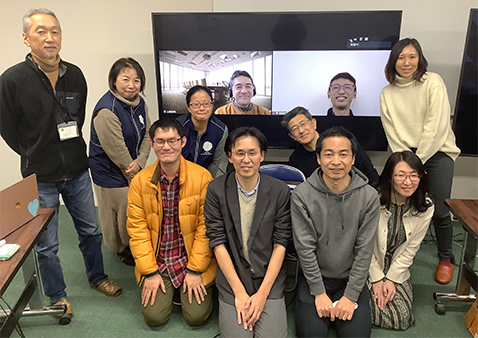
With 3.11 Future Support Association staff
Ms. Katsumata’s decision to participate in the Pro Bono project was motivated by her desire to “do what I can do for others.” The Pro Bono experience not only provided Ms. Katsumata with important insights into her work and projects but also allowed her to meet people she will treasure for the rest of her life.
Ms. Katsumata’s decision to participate in the Pro Bono project was motivated by her desire to “do what I can do for others.” The Pro Bono experience not only provided Ms. Katsumata with important insights into her work and projects but also allowed her to meet people she will treasure for the rest of her life.
The Pro Bono project in which Ms. Katsumata participated:
“3.11 Future Support Association” shifted its focus from emergency relief to activities to pass down the story of the Great East Japan Earthquake to the next generation. The Pro Bono team, consisting of six Panasonic employees, worked to create a “business plan” with the goal of making the organization’s mainstay Storyteller business profitable.
